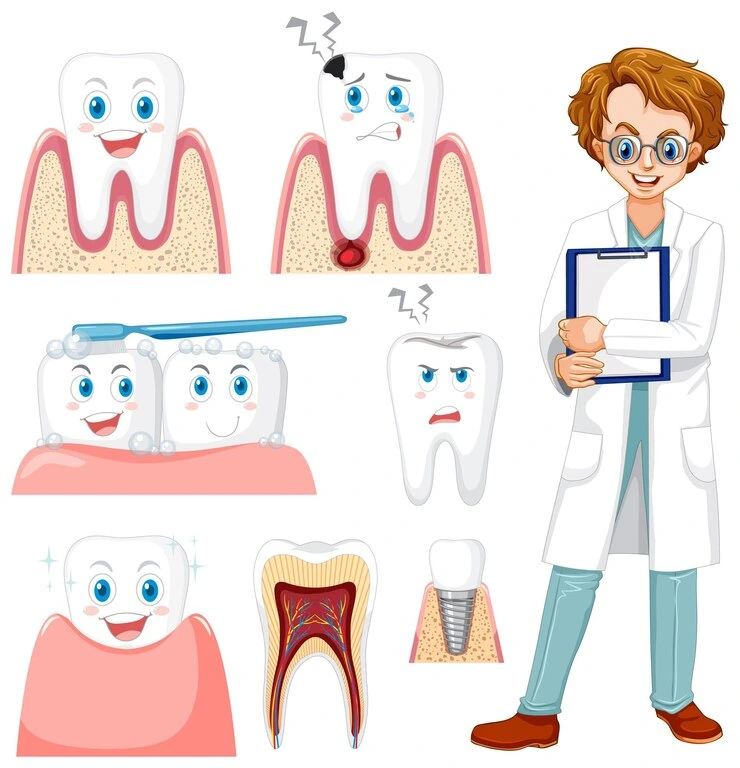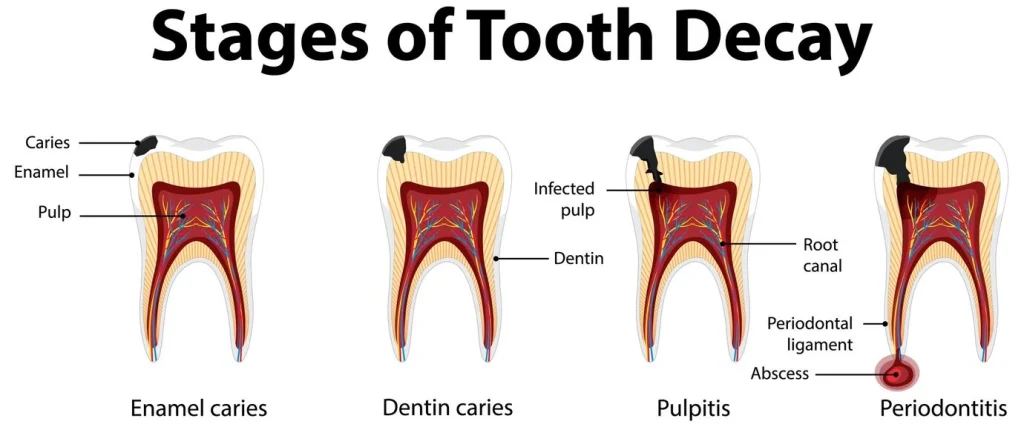
Gum disease, also referred to as periodontal disease, is one of the illnesses that millions of people worldwide suffer from. However, it still does not seem to be taken seriously. Hardly anyone knows the damage it can bring to overall health. Most people treat gum problems merely as a dental issue confined to the mouth. At the same time, though, recent research has discovered that the health of the gums can also determine the health of other systems in the body. It is important to consider this angle, as it plays one of the key functions in the holistic treatment of health since it further encourages dental hygiene and a well-maintained lifestyle.
What Exactly is Gum Disease?
An infection affecting the tissues that support and surround teeth is known as gum disease. This type of infection is generally caused by bacterial plaque build-up, which attaches to the teeth and grows on the surface of the gums. This bacterial infection can lead to inflammation, and eventually, the infection spreads into the gums.
The development of gum disease occurs in two important stages:
1. Gingivitis:
The initial and earliest stage of gum disease is gingivitis. The gums become red and swollen, and they bleed quite easily at this stage of the disease. This is the mildest form of gum disease, and treatment can reverse it with good oral hygiene, including brushing regularly, flossing, and having professional cleanings by a dentist.
2. Periodontitis:
It can develop into a serious form of gum disease called periodontitis, where the gums move away from the tooth and form pockets that become infected with even more bacteria. Over a long period, the bony foundation of the teeth can suffer permanent damage, which may lead to tooth loss. This is a serious condition that requires medical attention to avoid tissue loss.
Over some time, gum disease takes the mouth area to a systemic level, contributing to other diseases in the body. The gums have effects beyond the mouth, including inflammatory processes associated with gum disease, responsible for other serious conditions.
What Causes Gum Disease? The Role of Bacteria and Inflammation
It is caused by the development of a sticky film on the surface of the teeth, which is the actual cause of gum disease and is termed bacterial plaque. Usually, cleaning and flossing regularly should eradicate this. If bacterial plaque is not removed, it will take some time to harden into tartar, which aggravates the gums and stimulates the growth of bacteria. Once an infection has occurred, the immune system can trigger an inflammatory response to fight these harmful bacteria, and this only causes damage through prolonged exposure.
That is where chronic inflammation becomes such a problem because it does not remain confined to the oral cavity; it spreads throughout the body. The bacteria and inflammatory mediators residing in the gums can enter the bloodstream and then influence the function of other organs and systems. This connection that has developed between oral health and systemic health is a very important area of research in the recent past and implies that taking care of teeth and gums will also help benefit the body as a whole.

Health Conditions Associated with Periodontal Disease
The link between gum disease and systemic health is well-established and is increasingly associated with several significant diseases. Some of them include: cardiovascular diseases, diabetes, other respiratory diseases, birth-related complications, and rheumatoid arthritis. The following are some ways gum disease can affect overall health:
1. Cardiovascular Diseases:
For example, many studies show a strong association between gum disease and heart disease, strokes, and atherosclerosis (narrowing of the arteries). This is because inflammation due to gum disease appears to be associated with increased plaque deposition in arteries, causing atherosclerosis, which predisposes people to heart attacks and strokes. Specific bacteria in the mouth, such as Porphyromonas gingivalis, have been isolated in atherosclerotic plaques; therefore, oral bacteria can invade the body through the bloodstream and directly affect the cardiovascular system.
According to the Journal of Periodontology, individuals with a history of periodontitis have a far greater predisposition to heart disease. Thus, research proves that the chronic inflammatory aspects of the gums, associated with plaque development in the arteries, are one of the causes of increased risk in cardiovascular events.
2. Diabetes:
Diabetes has a two-way relationship with gum disease. People with diabetes develop gum diseases because their immune system is unable to fight infections, like that of gum disease. On the other hand, it makes the condition worse by causing inflammation that makes controlling blood sugar, which significantly aggravates diabetic symptoms, harder.
It has been demonstrated in various studies that treating gum disease in diabetic patients improves the odds of blood sugar regulation and continues to stress salubrity in an overall approach to diabetes management.
3. Respiratory Illnesses:
Oral bacteria from gum disease or periodontitis that are inhaled may also infect the lungs and cause infections such as pneumonia. Periodontal disease may aggravate the situation among patients suffering from chronic respiratory diseases like COPD, as it further limits lung function. Studies suggest that optimising oral hygiene, as well as regular visits to the dentist, may lower risks for respiratory infections such as pneumonia, particularly for older adults and those who are immunocompromised.

4. Complications of Pregnancy:
Pregnancy-related gum diseases increase the chances of giving birth prematurely or the baby weighing less at birth. The inflammation of the gums releases mediators which lead to prostaglandins that cause preterm labour. An article from the American Journal of Obstetrics & Gynecology found that women with untreated periodontitis had greater chances of premature deliveries than those without periodontitis, making oral health improvement among pregnant women very effective in reducing related risks.
5. Rheumatoid Arthritis (RA):
Chronic inflammatory joint disease is what rheumatoid arthritis is; it has many similarities with gum disease, particularly in the inflammatory pathways. Some studies have shown that bacteria (e.g., Porphyromonas gingivalis) isolated in people with gum disease might increase rheumatoid arthritis symptoms. Many people with gum disease can treat their oral problems through gum treatment, resulting in decreased inflammation and improvements in the symptoms of rheumatoid arthritis.
Mechanisms Behind the Connection Between Gum Disease and Systemic Health
The various possible ways in which gum disease can affect systemic health include the following:
- Infiltration into the Bloodstream: Bacteria from the diseased gums enter the bloodstream, leading to inflammation and infections at various sites in the body.
- Inflammation Mediators: Pro-inflammatory cytokines released due to gum disease might infiltrate the bloodstream, thus becoming accessible to work on other processes in the body as a whole and can worsen already disastrous other health conditions.
- Immune System Overload: Chronic gum infection overloads the immune system, reducing its ability to fight infection and maintain inflammation control in other parts of the body.
The Importance of Preventing and Treating Gum Disease
The growing body of evidence linking gum disease to systemic disease makes it increasingly important to treat and prevent gum disease. Here are some essential practices to maintain good oral health:
- Dental Oral Hygiene: Gum diseases are prevented through brushing twice daily, flossing once, and having a clean by a dentist at least once every six months.
- Scaling and Root Planing: This is a process that deep-cleans teeth and gets rid of plaque and tartar below the gumline, thereby decreasing inflammation and preventing continued deterioration.
- Antibiotic Therapy: In certain instances, such as with bacterial infections, antibiotics may be prescribed to help control the condition in the gums.
- Surgical Treatment: In general, surgery is performed in cases of tissue destruction or damage to bony structures.
Final Thoughts
It has become clear that gum disease can lead to a host of other illnesses elsewhere in the body. Oral hygiene involves cleaning teeth as well as improving the general condition of health. Treating gum disease may greatly reduce one’s chances of having a heart attack, help control diabetes better, maintain respiratory health, or possibly even lower inflammation in the body.
Regularly visiting the dentist and maintaining good oral hygiene can help treat gum infections early, among other things, as part of a comprehensive approach to being healthy. Science continues to reveal discoveries about how the mouth is linked with the body, but for now, it is clear that a healthy mouth, well-maintained with a smile, can lead to a healthier life.


